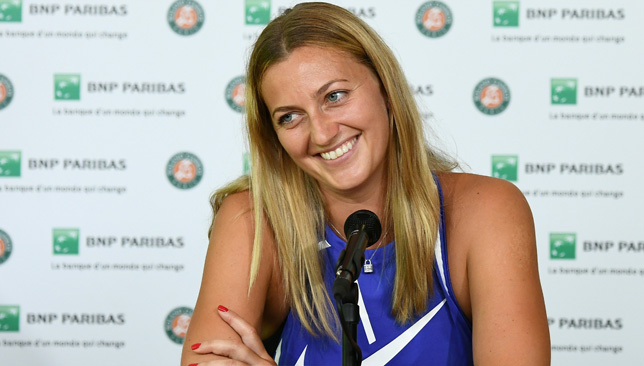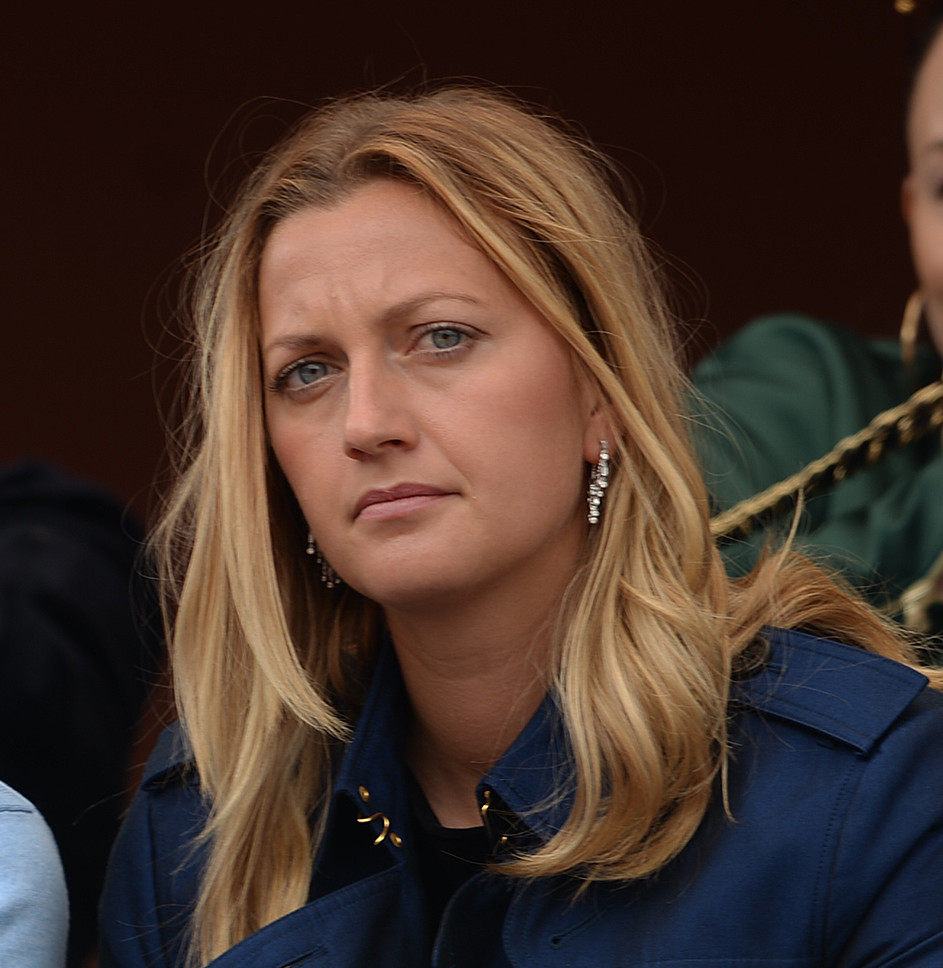
PARIS — Petra Kvitova did not cry when she addressed the press at Roland Garros on Friday but her eyes were full of tears.
Six months on from being attacked by a knife-wielding intruder at her home in the Czech Republic, Kvitova made a surprise last-minute decision to play the French Open thanks to a faster-than-expected recovery.
“Nobody knew if this day would come,” Kvitova told reporters in Paris on Friday ahead of her first round against Julia Boserup.
“I’m really happy that really here, the dream comes true. I’m here in the draw and I’m playing tennis again, and was a difficult time for me, of course. It wasn’t easy, but I’m happy that I work through this and I can play tennis and I can be in the draw.
“I know that my hand, it’s not perfectly ready. It’s still not 100 per cent ready, so we will see how everything goes, but I’m happy that I am able to play again.”
While fighting off the intruder, the two-time Wimbledon champion sustained injuries to all five fingers of her left playing hand and her doctor said the chances of her playing tennis again were “very low”.
“The injury was horrific,” said Kvitova’s doctor Radek Kebrle. “The chances of Petra’s hand healing well enough for her to be able to play tennis again were very low for multiple reasons.”
A smile that we all share. @Petra_Kvitova is back on tour pic.twitter.com/pFosczvWC2
— Jimmie48 Photography (@JJlovesTennis) May 25, 2017
She had surgery on December 20, 2016 and had her hand in a protective splint for eight weeks. She started her rehab from the second day after her operation, making small movements with her fingers, which she couldn’t move fully.
“Every kind of small millimetre made me happy,” she recalls.
She held a tennis racquet for the first time at the end of March, hitting soft balls – it felt “very very weird” Kvitova says, and began practicing on clay in Monaco at the beginning of May.
The 27-year-old returns to the tour with a new perspective on life and a renewed love for the sport after going through the toughest challenge of her career.
“It was difficult. I mean, not many people believed that I can play tennis again,” said Kvitova. “So I’m happy that I can play. I actually already won my biggest fight.
“I’m happy that I like challenges. That was one of the biggest, of course. So I stayed alive and I have all my fingers, I can play tennis and I can be here and be in the draw.
“And I’m really looking forward for my match which – when I watch some of the, I can’t say matches, but I saw something on the TV, I didn’t really feel great. I felt like the tennis was taken away from me, and it wasn’t my decision. Suddenly I couldn’t do what I love. So I’m happy that I can be here and enjoy the tennis.”
What happened to Kvitova was a traumatic experience – one that she continues to deal with emotionally.
“I didn’t sleep well the days after, but I wasn’t really staying alone. I have been always with my family or with my coaches or with friends, which I need to say thank you to them, because they were really incredible, and they still are. So I’m happy that I have them,” she says.
“I don’t really have nightmares. From the beginning I was feeling really weird when I went in the city or somewhere. I was always staring to the guys and looking if there are no strangers there. But with the time, it’s better. But of course I’m more, how do you say, more actively watching the people around me.
“I see life a little bit from the different angle. So I’m happy that I’m here.”

Kvitova’s change in perspective meant that she realised how much she loved the sport, but also that it is only just a sport.
“I mean, sometimes when I don’t put a ball inside the court, I’m not crying,” she joked with a laugh.
“Now I can just enjoy everything and even – it’s beautiful weather outside. Sometimes I just stand outside and see the sun and say ‘Oh, it’s beautiful’. I see different kind of things than before.”
Kvitova’s keeping her expectations low and tried to explain the reason behind her decision to play in Paris, rather than wait for the grass season.
“I have to start somewhere,” said with a smile. “I know it’s a Grand Slam, but it’s good practice. But, I mean, for me right now, it’s not like a Grand Slam. It’s something like more. And when I will step on the court will be something really different compared to anything.
“I just took it as experience. You know, to be sitting at home and know that I can play but I’m not here and just will be practicing for two weeks will be not really the best option for me. I love to play matches instead of practicing. So I’m here and I will try to do my best, of course, in the match, as well, but from a little bit different angle.”
Kvitova hired a new coach, Jiri Vanek, last December. Right now, they’re not working on anything particular in her game, and are keeping things simple.
“We are just, you know, trying to hit as much as I can, to play fast, and that’s it,” she said.
“It’s not really easy time for my coach right now. But hopefully he will have some good time with me to practice what he wants. But just now, it’s really the basic stuff.”
Vanek, the former coach of Kvitova’s compatriot Karolina Pliskova, admits it’s been a tough period for the team, but that staying positive was key.
“I have to say that I’m happy I could help Petra in this tricky situation,” said Vanek.
“It was really tough for all of us but Petra stayed strong. The first few months were the worst because we didn’t know how the hand would respond to work, but we were positive. When we couldn’t do anything with the hand, David (Vydra, fitness coach) did a lot of work on her fitness.
“When she was able to hold something, we started to hold glasses, soft balls, just gripping them. Then we started to hold the racquet, from the beginning it was just for one minute and then we started to build up the time.
“We played with very soft balls from the net and then tried to move further and further back, closer to the baseline. Before she could grip the racquet we played with her right hand, we also played other sports like table tennis and badminton with her right hand. Then we started with backhands because the forehand was too difficult, serve too.
“I was surprised by how well she responded and how motivated she was to come back. Her motivation was and although it was a tough experience, Petra was always inspired by the challenge of playing again.”
There’s been an outpour of love and support from the locker room towards Kvitova – who is known to be one of the nicest players on tour.
Simona Halep was one of the players to comment on her return yesterday, saying: “What happened was really, really tough. But she’s strong enough, so she came back fast. I wish her all the best, and to enjoy the time on court. I know that she’s very happy now.